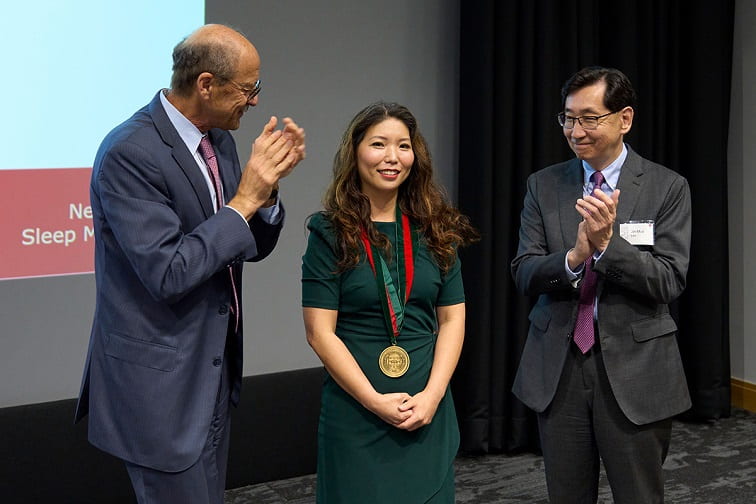Neurologist Yo-El Ju, MD, a physician-scientist whose discoveries have illuminated the complex relationship between sleep and neurodegenerative disease, has been named an inaugural Barbara Burton and Reuben M. Morriss III Professor at Washington University School of Medicine in St. Louis.
Ju was installed by David H. Perlmutter, MD, executive vice chancellor for medical affairs, the George and Carol Bauer Dean of the School of Medicine and the Spencer T. and Ann W. Olin Distinguished Professor.
The professorship was created through a bequest from Reuben M. Morriss III and Barbara Burton Morriss to Washington University, to advance Alzheimer’s disease research. The bequest funds three professorships at the School of Medicine.
“The Morriss family’s generous support for Alzheimer’s research represents a heartfelt commitment to improving the lives of countless individuals and families affected by this terrible disease,” said Chancellor Andrew D. Martin. “Their benevolence reaffirms the importance of collaborative efforts in the pursuit of medical breakthroughs and accelerates progress toward finding better treatments and, ultimately, a cure for this complex condition.”
Alzheimer’s disease was Ju’s entry point into the world of sleep and neurodegeneration. In 2013, building on work from the lab of David M. Holtzman, MD, the Barbara Burton and Reuben M. Morriss III Distinguished Professor, she, Holtzman and colleagues published the first study in people that showed an association between poor sleep quality and presymptomatic Alzheimer’s disease. In 2017, she published a paper in the journal Brain demonstrating that disruption of slow-wave sleep — the deep, restful phase of sleep — is associated with higher levels of amyloid beta, a brain protein that, when it accumulates, is linked to Alzheimer’s disease. This discovery opened the door to experimental sleep-based interventions to prevent or treat Alzheimer’s.
“Philanthropy and generosity were hallmarks of the lives of Mr. and Mrs. Morriss, whose investment in Washington University, and specifically in Alzheimer’s research, continue to make a profound difference today,” Perlmutter said. “Yo-El Ju’s work on disordered sleep and how it impacts Alzheimer’s disease brings rigorous clinical research into a fascinating area of everyday life that has an enormous impact on health and disease. I am so excited about the work that she is doing, and I know she will continue to make an impact.”
More recently, Ju has expanded her focus to include other neurodegenerative diseases characterized by toxic accumulation of brain proteins. She leads an international consortium studying REM sleep behavior disorder (RBD), a condition characterized by the acting out of dreams and the buildup of the protein alpha-synuclein in the brain. About 80% of people diagnosed with RBD go on to develop a neurodegenerative disease such as Parkinson’s disease or Lewy-body dementia. The consortium is developing clinical, neuroimaging, and biofluid biomarkers of synuclein-associated diseases in preparation for a future clinical trial to treat RBD and prevent the development of serious neurodegenerative disease.
“Yo-El Ju is internationally recognized for her studies relating sleep to the pathogenesis of several neurodegenerative diseases,” said Jin-Moo Lee, MD, PhD, the Andrew B. and Gretchen P. Jones Professor and head of the Department of Neurology. “She published several landmark studies supporting a link between sleep disturbance and biomarkers of Alzheimer’s disease. It’s an honor to have her on our faculty.”
